Convenient Omissions on the Road to Guantanamo
Michael Winterbottom and Mat Whitecross have made a necessary and important critique of grave injustices at Guantanamo Bay. But are their storytelling techniques entirely on the level?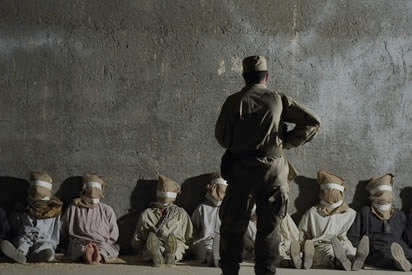
Editor’s note: Michael Winterbottom and Mat Whitecross have made a necessary and important critique of grave injustices at Guantanamo Bay. But are their storytelling techniques entirely on the level?
WHEN politically engaged filmmakers pursue their craft with a righteous sense of addressing injustice, how much should we quibble about the balance and rigor of their works? At a time when both the mainstream media and our government routinely peddle baldfaced propaganda, should minority voices in the documentary film community be given a free pass when it comes to bias simply because we happen to agree with their positions?
Just consider: Fox News, hiding under its banner of ?Fair and Balanced,? bombards us with pro-war, thinly veiled government press releases; the supposed ?paper of record? in New York facilitated a massive campaign of fraud on the American people over the WMD issue; and the current White House has waged an ongoing and deliberate misinformation campaign to justify an unjustifiable war. Knowing all these things, is it wrong to fight fire with fire? Don?t we need some good, solid propaganda of our own? Shouldn?t we rejoice in the recent wave of movies that either obliquely or directly question the dogma and activities of our government, movies like ?Good Night, and Good Luck,? ?Syriana,? ?An Inconvenient Truth,? and now, opening wide in America this weekend, ?The Road to Guantanamo,? a scathing indictment of our country?s flouting of due process and the Geneva Conventions in Cuba?
This is the question that any American who goes to see ?The Road to Guantanamo? will have to contend with. And see it you should, especially if you?ve ever toyed with the notion that those camps are, or should be legal, or that our actions there do not constitute torture.
The filmmakers, Michael Winterbottom (?Tristram Shandy,? ?Code 46,? ?9 Songs,? ?24 Hour Party People?) and Mat Whitecross, re-create the experiences of ?The Tipton Three,? British nationals who were unfairly imprisoned at Guantanamo and released only after months of physical and psychological abuse.
The film?s combination of interviews with the men, documentary footage and dramatized re-creations makes for a compelling and disturbing narrative, but it would be more so if there weren?t some confusing holes in the three men?s story?holes that the filmmakers chose to ignore.
That story goes like this: The young men — Shafiq Rasul, Asif Iqbal and Ruhel Ahmed — fly to Pakistan a few weeks after Sept. 11, ostensibly so that one can meet his intended bride and his friends can visit with relatives (a fourth goes with them, but he disappears during the chaos and has never been heard from again). In Pakistan, they see a large gathering at a mosque and decide to enter. There they hear a speech about the coming war, urging the faithful to cross to Afghanistan and ?help? any way they can. Over dinner that night, they decide to heed the call. We never find out what ?helping? means, but we hear that they hope to see new lands, and taste the country?s ?really big naan. [bread]? After a tough crossing, they spend a few weeks in Kabul, get bored, try to recross the border, and after a harrowing journey through a war zone find themselves in the hands first of the Northern Alliance and then American forces?and finally, in Cuba.
The trip, by their account, was spontaneous, well intentioned and noncombative. If their version of events is true, it wouldn?t be the first time young men made a dumb decision and ended up in the wrong place at the wrong time. But several critics have pointed out clear discrepancies in this version of events, most convincingly David Aaronovich, a Times (UK) columnist who points out in particular that the mosque in question is a known hotbed of jihadist activity and recruitment. Winterbottom and Whitecross would have served their cause better if they had asked harder questions about the young Muslims? politics both before and after their time in Cuba. Why not ask the men directly about their sympathies, allegiances and emotional responses to the exhortations at the mosque, and let their answers be part of the film? It would have also made for more gripping cinema — shades of gray are part of what we look for in great art, political or otherwise.
It is crucial to understand that their answers to these questions would not have impacted the magnitude of the miscarriage of justice against them: The strongest piece of evidence that American and British authorities had to support their charge that the three were terrorists was footage of three similar-looking men at a Bin Laden-led rally in Afghanistan in 2000. However, as the film makes clear, all of the Tipton Three were irrefutably in Britain at the time.
What?s worse, even had they attended the rally, their presence shouldn?t have been a sufficient cause for their imprisonment — not if we value American freedoms, one of which is freedom of assembly. There are many U.S. and British nationals who sympathize with all sorts of vicious ideologies, including Islamo-fascism and white supremacy. People do not have to be likable or liberal-minded to be deserving of fair and humane treatment.
In their dramatized scenes at Guantanamo, the filmmakers are on surer ground, which is ironic, considering that the scenes are reenactments. We witness brutal interrogations, religious humiliation and familiar American accents shouting slurs and obscenities. We feel the merciless Cuban sun beating down on the prisoners? heads, even as they are forced at gunpoint to cease from trying to build themselves sun shelters. In one of the film?s most affecting and disturbing scenes, the men are bound into a forced crouch, shackled for hours in the dark while being blasted with ear-splitting rock ?n? roll. As Winterbottom himself insisted in an interview with LA Weekly, everything shot was based on documented and acknowledged U.S. policy in Guantanamo. (And of course, the U.S. government does not consider any of those practices torture.)
Again, if the story isn?t exactly untrue, but instead just a bit squishy on the hard questions –like what the three men were actually doing in Afghanistan — should we care? After all, if these filmmakers have not necessarily addressed the issue perfectly, we can and should be thankful that they have addressed it at all. And in the end ?The Road to Guantanamo? is a movie that leaves you thinking, not about cinema but about the responsibilities of citizenship. We are Americans, and the Tipton Three suffered a fate in our hands that lays waste to our claims to goodness, the values in our schoolbooks, our Constitution and, finally, our right to a sound night?s sleep.
The only weapon we have against orchestrated disinformation is a countervailing commitment to scrupulous honesty. The filmmakers of ?The Road to Guantanamo,? however, did not necessarily meet that standard. At best, they left unchecked crucial holes in the stories of the Tipton Three; at worst, they decided in bad faith to ignore the trio?s true sympathies. In doing so, the filmmakers have run the risk of legitimizing a truly pernicious idea: that only people whose views conform to ours deserve our protection. Had the filmmakers taken the additional step of examining the three men?s real motivations for crossing into Afghanistan, and had it turned out that the trio was, in fact, sympathetic to the aims of the Islamists, none of that would have justified the miscarriage of justice that led them to Guantanamo, nor would it have warranted the inhuman treatment they received there. But it would have cemented our trust in Winterbottom and Whitecross.
And trust matters. There is a faint ray of light in the film?s darkness?one that opens the door between prisoner and guard, American and enemy. In one re-created scene, Tipton Three member Shafiq Rasul, a 20-year-old hip-hop fan, performs his own rap for one of an American soldier, who has asked him to recite his flow.
Grinning in his cage and orange jumpsuit, he begins:
?My name is Shafiq and I?m from Tipton / I tell ?em I ain?t Taliban but they don?t wanna listen.?
As Shafiq bobs his head during his British-accented flow, the young soldier smiles faintly, and for a moment the men seem on the verge of an understanding. The moment passes, but in a film that is above all a chilling depiction of dehumanization and injustice, the episode gives hope.
Wouldn?t it be nice if we could be sure it really happened?
Your support matters…Independent journalism is under threat and overshadowed by heavily funded mainstream media.
You can help level the playing field. Become a member.
Your tax-deductible contribution keeps us digging beneath the headlines to give you thought-provoking, investigative reporting and analysis that unearths what's really happening- without compromise.
Give today to support our courageous, independent journalists.
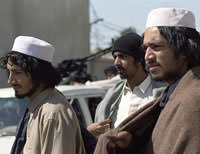
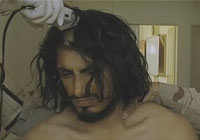

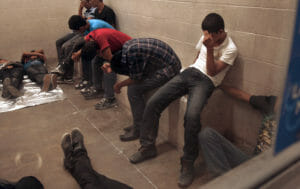
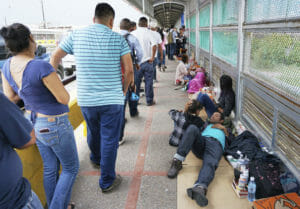
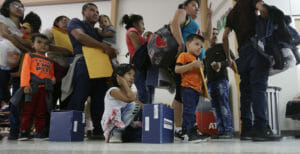
You need to be a supporter to comment.
There are currently no responses to this article.
Be the first to respond.